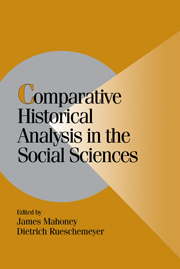12 - DOUBLY ENGAGED SOCIAL SCIENCE
THE PROMISE OF COMPARATIVE HISTORICAL ANALYSIS
Published online by Cambridge University Press: 05 June 2014
Summary
Social science achieves its potential and proves its worth as a human enterprise when it offers “substantive enlightenment … about the social structures in which we are enmeshed and which largely condition the course of our lives,” declared Lewis Coser (1975, p. 698) in his 1975 presidential address to the American Sociological Association. As Coser articulated this demanding standard, U.S. social science was not only caught up in the social upheavals triggered by “the sixties.” It was also in the early stages of what was to become a remarkable renascence of comparative and historical scholarship engaging big questions about social change and politics.
To be sure, Coser's vision was in tension with reigning academic paradigms of the 1960s and 1970s. Economists were committed to abstract equilibrium models almost entirely detached from empirical trends, while most sociologists and political scientists practiced what C. Wright Mills (1959) decried as “abstracted empiricism” tempered with flights of artificially generalized “grand theory.” Enamored of advances in survey research and statistical analysis, most postwar U.S. sociologists and political scientists produced atemporal studies of contemporary social problems, voting behavior, or processes of individual status attainment, while a minority of macroscopically focused scholars attempted to fit all the nations of the world along a single evolutionary path toward the “modern social (or political) system” – a construct that looked suspiciously like an idealized version of the United States circa 1960.
- Type
- Chapter
- Information
- Comparative Historical Analysis in the Social Sciences , pp. 407 - 428Publisher: Cambridge University PressPrint publication year: 2003
References
- 30
- Cited by

